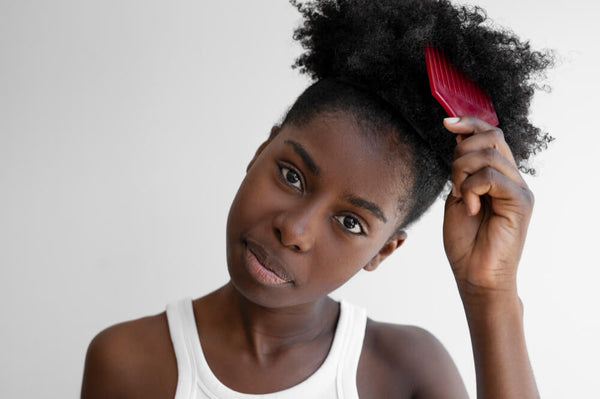Let's be real for a second. That relentless itch. The embarrassing flakes on your black shirt. The way you find yourself unconsciously scratching throughout the day until it actually hurts. And worst of all—the handful of hair you see in the drain that seems directly connected to all that scalp chaos.
If you're stuck in this cycle, you've probably tried every dandruff shampoo at the drugstore. They might work for a minute, but the problem always comes roaring back, sometimes even angrier than before. What you're likely dealing with isn't just simple dandruff; it's probably seborrheic dermatitis. And for those of us with textured hair, the constant styling, oils, and products can sometimes make it a perfect storm.
What's Really Going On Up There?
Seborrheic dermatitis is basically your scalp throwing a constant inflammatory tantrum. It's that red, itchy, scaly patch you can feel, often along your hairline, behind your ears, or at the crown.
Here’s the thing everyone gets wrong: it’s not about you being "dirty." It's a chronic condition where your scalp's natural yeast (called Malassezia) overgrows and your immune system freaks out in response. It's like your scalp has a super low tolerance for this normally harmless yeast, so it launches into this inflamed, flaky state.
Stress, hormonal shifts, and even the wrong hair products can pour gasoline on this fire.
The Real Reason You're Losing Hair (It's Not the Fungus)
So, does seborrheic dermatitis directly cause hair loss? Not exactly. The fungus itself isn't eating your hair.
The hair loss happens because of the aftermath of the condition:
-
The Never-Ending Itch-Scratch Cycle: That inflammation is maddeningly itchy. Every time you scratch, you're physically abusing your hair follicles. You're causing micro-tears, creating more inflammation, and literally breaking your hair off at the root. It's a brutal, self-perpetuating loop.
-
The Follicle Strangulation: All that scaling and buildup? It can clog your follicle opening. Think of it like trying to grow a plant through a layer of concrete. The inflammation also swells the tissue around the follicle, choking it and making it impossible for a healthy hair to push through.
The good news? This means when you calm the inflammation and get the flaking under control, the hair can almost always grow back. The follicle is just stunned, not dead.
Why That Drugstore Shampoo Isn't a Long-Term Fix
Look, that medicated shampoo with zinc or selenium sulfide? It's a band-aid. It might suppress the symptoms for a few days by killing off some surface-level yeast, but it does nothing to address why your scalp is overreacting in the first place.
It's also often way too harsh and drying for Black hair, stripping our delicate strands of the moisture they desperately need, which leads to a whole other set of problems. You're left with a dry, brittle mane and a scalp that's still secretly brewing a storm.
Our Approach: We Find & Solve The Root Cause
At Nina Ross Hair Therapy, our team treats seborrheic dermatitis from every angle in a comprehensive way so the risk of it coming back also stays minimal.
1. We Start with Advanced Diagnostics. Is it really seborrheic dermatitis, or is it psoriasis? Or a severe case of folliculitis? Or all of the above? We use scalp scoping to see exactly what's happening at the follicular level so we're not just guessing.
2. We Soothe Your Scalp. We use medical-grade treatments that reduce the inflammation without causing any kind of damage to the textured hair. This isn't about stripping your scalp; it's about balancing its microbiome and healing the skin barrier.
3. We Find Your Personal Triggers with Functional Medicine. This is the game-changer. Why is your immune system so reactive? We look at the whole picture. Could it be:
-
A Hidden Gut Issue? Gut inflammation directly shows up as skin inflammation.
-
Hormonal Imbalances? Fluctuations in androgens can skyrocket oil production.
-
A Nutrient Deficiency? Are you missing key vitamins like B vitamins or Zinc that keep inflammation in check?
We use targeted lab testing to find these root causes so we can build a plan that actually lasts.
4. We Use Targeted, Intelligent Products. Our Nina Ross Dermatitis Shampoo is formulated differently. It's designed to manage flare-ups without destroying your hair's integrity. And internally, supplements like our Nina Black Currant Seed Oil Soft Gels provide powerful gamma-linolenic acid (GLA) to help your body cool systemic inflammation from the inside out.
For cases where the inflammation has caused significant thinning, we can later incorporate regenerative treatments like PRP to help revive those stunned follicles and encourage dense regrowth.
Tired of the Itch-Scratch-Shed Cycle?
You don't have to just live with this. That constant awareness of your scalp, the fear of wearing dark colors, the frustration of seeing your hair thin—it's exhausting. Let's get you out of that loop.
Book your Hair Therapy Evaluation with us for just $99 and let's finally give your scalp the peace it needs so your hair can thrive.














